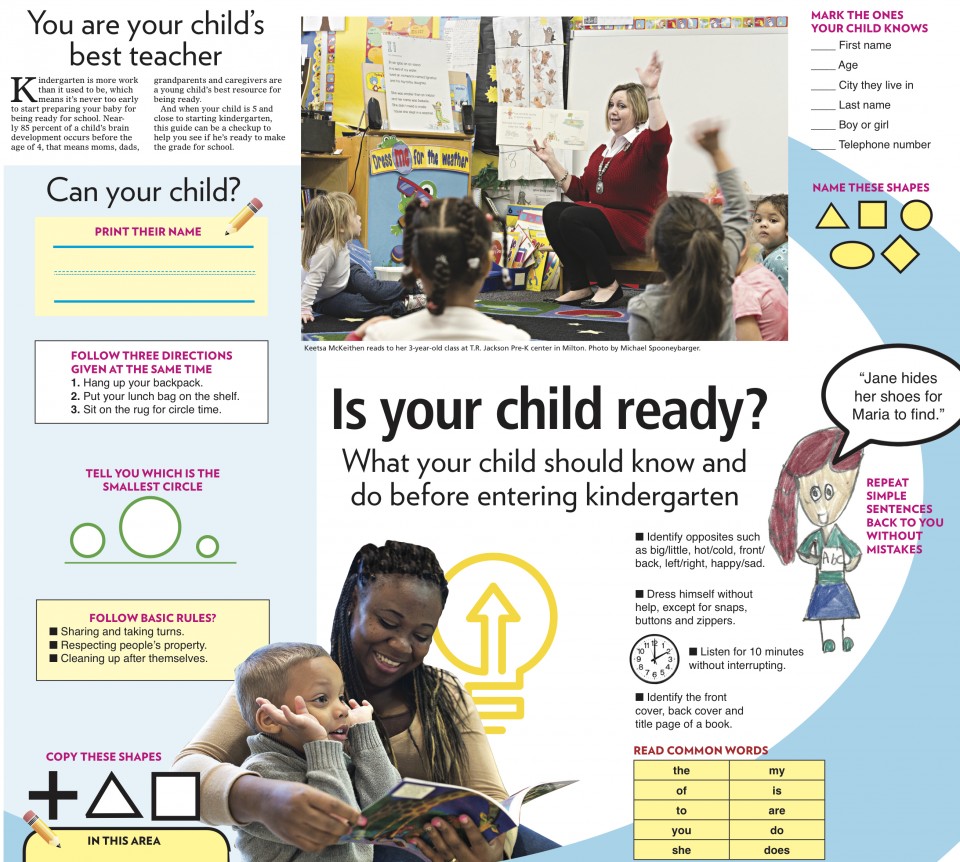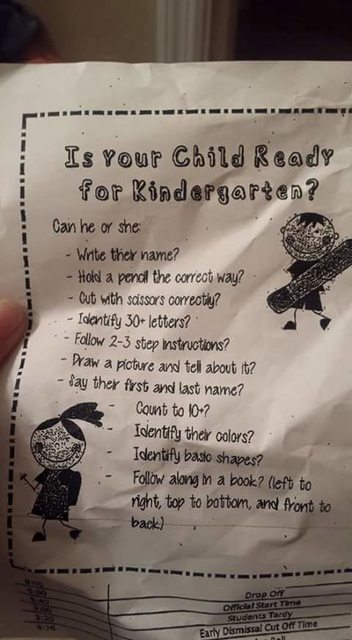Building a strong early literacy foundation
- August 10, 2016
- / Reggie Dogan
- / education

Kindergarten signifies the start of a child’s formal education. It is, in many ways, the gateway in the education journey.
School starts in Escambia County this week, and among the big questions will be, “Is my child ready for kindergarten?”
Kindergarten readiness used to be as simple as ABC and 123. Today’s a different time.
Different times calls for different measures.
Children now are expected to hit the ground running. Now that kindergarten serves as a gatekeeper, not a welcome mat, to elementary school, concerns about school readiness begin sooner rather than later.
A child who’s supposed to read by the end of kindergarten had better be getting ready in preschool. As a result, expectations that may arguably have been reasonable for 5- and 6-year-olds, such as being able to sit at a desk and complete a task using pencil and paper, are now directed at even younger children, who lack the motor skills and attention span to be successful.
The Studer Community Institute Dashboard’s kindergarten readiness metric shows that 66.2 percent of Escambia County’s 5-year-olds are ready for kindergarten.
Of the nearly 3,000 kindergartners in Escambia County Schools this year, about 1,000 of them weren’t ready for school.
More than 175,000 4-year-olds statewide participate in Voluntary Pre-Kindergarten, which is 77 percent of all eligible children.
In the first year of VPK in 2002, the state allotted $2,500 for early learning per child. More than a decade later, the allotment is $2,437 for each child in VPK, less than when it started.
Escambia County’s share of the funding for this current school year is $5.4 million.
VPK offers childcare providers funding to pay for a half-day of preschool for all Florida 4-year-olds.
To attend kindergarten in Florida, a child must turn 5 years old on or before Sept. 1. Children don’t have to attend kindergarten, because the compulsory school age is 6 years old.
While kindergarten is not mandated in Florida, the increased educational demands brought about by the tougher standards and an increased focus on school grades and state testing mean there’s even greater emphasis on early learning.
In an article on Today.com, “Is Your Child Ready for Kindergarten? School checklist raises anxiety, questions,” the issue of kindergarten readiness caused a little angst, brought laughter and raised some fears:
A kindergarten checklist posted recently to Reddit has created an online conversation — and stirred up parental angst — over whether expectations are too high for such youngsters. "Is your child ready for kindergarten?" the note reads, asking parents if their child can do things like write his or her name, follow two- or three-step instructions, count to 10, identify colors and use scissors correctly.The questions were just one part of a kindergarten supply list posted by a Tennessee elementary schoolA father of 5-year-old replied that his son knows how to do everything on the list except for one: "Identity 30+ letters."
School officials responded:
Tom Arnold, principal of Ooltewah Elementary School, which sent the checklist to parents, told TODAY in an email that the list was intended to provide "a bit of guidance" to parents as they prepared their child for school. He also acknowledged the school should have been clearer about the alphabet question; it meant students should be able to identify 30 or more upper and lowercase letters.
After the laughter subsided, some parents expressed their anxiety in finding out that expectations for their children had increased exponentially over the years.
Besides the matter of letters, the checklist included a preponderance of things a child should know by kindergarten, including the ability to read fluently.
Experts maintain that there’s no need to fret if Little Johnny can’t read upon entering kindergarten. But there are certain skills that give children a strong early literacy foundation as they enter school.
While there is no single or simple factor that accurately defines whether a child is ready to start school, there are some ways to tell if your child is mature enough physically, socially and cognitively to enter kindergarten.
It is likely that your child is ready to start kindergarten if he or she:
— Listens to instructions and then follow them. Children need these skills to function in class, to keep up with the teacher and with their peers.
— Is able to put on his coat and go the bathroom by himself. Children need to be somewhat self-sufficient by school age.
— Can recite the alphabet and count. Most kindergarten teachers assume that children have at least a rudimentary familiarity with the ABC’s and numbers, though these subjects will be covered as part of the kindergarten curriculum.
— Can hold a pencil and cut with scissors. He will need these fine motor skills to begin working on writing the alphabet and keeping up with classroom projects.
— Show interest in books. Does he try to “read” a book by telling a story based on the pictures? This is a sign that his language development is on a par with other kindergartners and that he’s ready to start learning how to read.
— Curious and receptive to learning new things. If a child’s curiosity is stronger than his fear of the unfamiliar, he will do well in school.
— Get along well with other kids. Does she share and know how to take turns? She’ll be interacting with other children all day, so your child’s social skills are particularly important for success in school.
— Work together with others as part of a group. The ability to put his needs second, to compromise and join in a consensus with other children, is also part of emotional competence.
A child’s first school experiences can influence the way he or she relates to others for the rest of life. Kindergarten is where children go to learn to read and write.
It’s often said that parents are young children’s first and most important teachers. Daycare providers and preschool teachers also play crucial roles in helping children learn and grow.
Working together, they all can be the driving force behind helping young children prepared for ready for kindergarten and the years beyond.

 CivicCon launches with a look at good growth in cities
CivicCon launches with a look at good growth in cities
 Building stronger brains one baby, one parent at a time
Building stronger brains one baby, one parent at a time
 SCI debuts commercial on Early Learning City
SCI debuts commercial on Early Learning City
 Entrecon: World class speakers and an opportunity to sharpen skills
Entrecon: World class speakers and an opportunity to sharpen skills
 PYP Quality of Life survey 2017
PYP Quality of Life survey 2017
 EntreCon Pensacola 2016: A look back
EntreCon Pensacola 2016: A look back
 Leadership tip: getting better employee takeaways
Leadership tip: getting better employee takeaways
 Leadership tip: be interested instead of interesting
Leadership tip: be interested instead of interesting
 Leadership tip: delivering difficult messages
Leadership tip: delivering difficult messages
 Brain Bags boost Arc, Early Childhood Court programs
Brain Bags boost Arc, Early Childhood Court programs